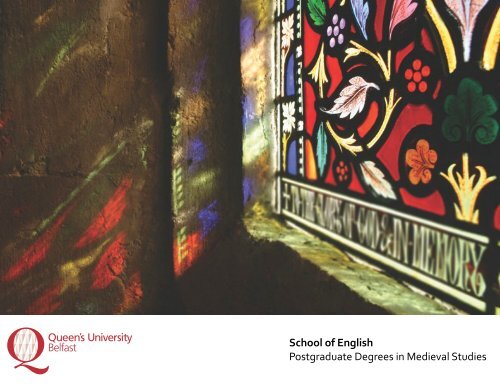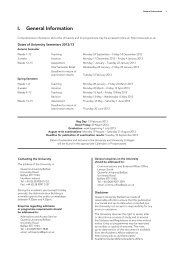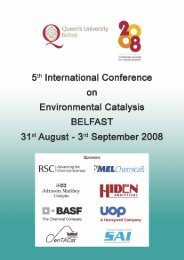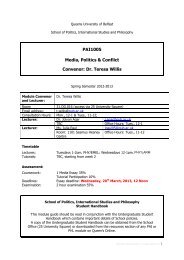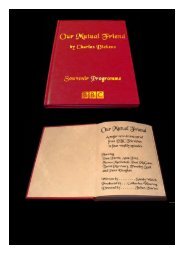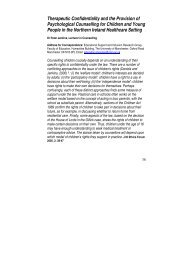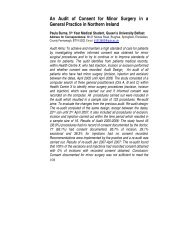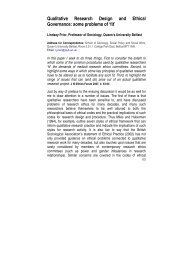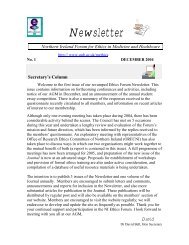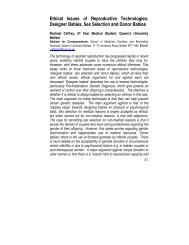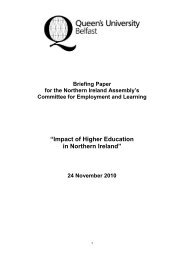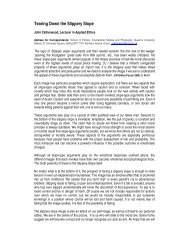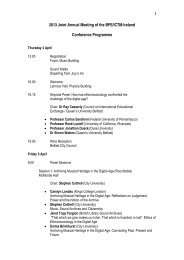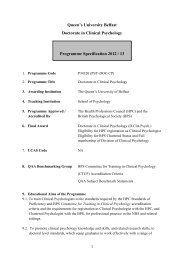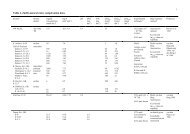MA brochure - Medieval Studies copy - Queen's University Belfast
MA brochure - Medieval Studies copy - Queen's University Belfast
MA brochure - Medieval Studies copy - Queen's University Belfast
Create successful ePaper yourself
Turn your PDF publications into a flip-book with our unique Google optimized e-Paper software.
School of English<br />
Postgraduate Degrees in <strong>Medieval</strong> <strong>Studies</strong>
Why <strong>Medieval</strong> <strong>Studies</strong> at Queen’s?<br />
Postgraduates who undertake <strong>Medieval</strong> <strong>Studies</strong> in <br />
the School of English at Queen’s join a lively and <br />
vibrant research and social culture. Staff working in <br />
<strong>Medieval</strong> <strong>Studies</strong> in the School are at the forefront <br />
of their disciplines, contributing to scholarship at <br />
national and international level, and they have a <br />
record of providing teaching and supervision of the <br />
highest quality. The expertise of staff ranges from <br />
the Anglo-‐Saxon period to late Middle English and <br />
beyond and our students are working right across <br />
this span.<br />
But as well as the teaching and supervision, there <br />
are plenty of activities involving researchers and <br />
students, which complement and extend the <br />
curricular and dissertation experience of <br />
postgraduates and provide communal support. The <br />
well-‐established weekly ‘<strong>Medieval</strong> Cultures’ <br />
seminar series attracts interesting speakers from <br />
far and near, including current students working at <br />
Queen’s. Our students also participate vigorously <br />
in postgraduate activities and initiatives more <br />
widely in the UK and Ireland, notably in the <br />
‘Borderlines’ annual conference, held in a different <br />
university in Ireland each year, and in national <br />
networking and training events such as the current <br />
‘Quadrivium’ series of workshops. <br />
Academic Environment<br />
Within Queen’s our staff and students have <br />
interdisciplinary links with other medievalists as <br />
part of the <strong>Medieval</strong> Forum, which is an <br />
interdisciplinary research group, comprised of <br />
students and staff in the Schools of English, History <br />
and Anthropology, Geography, Archaeology and <br />
Palaeoecology and the Institute of Theology. The <br />
Forum supports activities which internationalise <br />
research at <strong>Queen's</strong> and helps expose <strong>Queen's</strong> <br />
postgraduate students to current work in the field <br />
of medieval studies nationally and internationally. <br />
The Forum also works to broaden public <br />
engagement with research at <strong>Queen's</strong> on medieval <br />
cultural and historical studies.<br />
Resources and Facilities<br />
The School of English fosters personal and career <br />
development among postgraduate students and <br />
has a policy of engaging research students in <br />
teaching, as appropriate to the stage they are at, a <br />
policy fully embraced in <strong>Medieval</strong> <strong>Studies</strong>. We <br />
provide funding for postgraduates to help them <br />
with their work, enabling them to attend <br />
conferences and to make research trips. Other <br />
sources of such funding are also available in the <br />
<strong>University</strong>.<br />
The new McClay Library at Queen’s offers students <br />
work-‐leading facilities and research resources. <br />
<strong>Medieval</strong>ists at the School collaborate with Special <br />
Collections staff at the McClay Library to provide <br />
skills training in palaeography, codicology and <br />
book history generally. Students on the <strong>MA</strong> and <br />
PhD programmes consult archives in <strong>Belfast</strong>, <br />
Armagh and Trinity College Dublin as part of their <br />
research training.<br />
Postgraduate students have access to work and <br />
computing facilities in the School of English itself <br />
as well as in the Humanities Postgraduate Centre <br />
and the International and Postgraduate Centre, <br />
located near the McClay Library.
<strong>MA</strong> in English Literary <strong>Studies</strong> (<strong>Medieval</strong> <br />
<strong>Studies</strong>)<br />
Convenor: Dr Malte Urban<br />
The <strong>MA</strong> in English (<strong>Medieval</strong> <strong>Studies</strong>) enables <br />
students who have developed a keen interest in <br />
medieval literature and culture to pursue their <br />
interests in a more focussed way. The objective of <br />
the <strong>MA</strong> is to expose students to the professional <br />
preoccupations, critical and theoretical <br />
perspectives, and research skills constitutive of <br />
contemporary medieval literary studies. Students <br />
will encounter medieval texts in their material <br />
contexts for the first time, examining medieval <br />
manuscripts at <strong>Queen's</strong>, PRONI, the Armagh <br />
Library and, when possible, the library of Trinity <br />
College Dublin. There is considerable scope for <br />
independent research and students join a thriving <br />
postgraduate culture with a lively intellectual and <br />
social life.<br />
Staff on our <strong>MA</strong> have strong links with archives at <br />
the Armagh Library and PRONI, and there are <br />
normally opportunities for <strong>MA</strong> students to gain <br />
work experience through internships at these <br />
institutions.<br />
Modules Available in 2013-‐14<br />
Compulsory modules:<br />
• Research Methods -‐ this modules introduces <br />
students to local archival resources and research <br />
skills, such as palaeography and codicology.<br />
• <strong>Medieval</strong> Literatures and Cultures -‐ this module <br />
explores the transition from undergraduate to <br />
postgraduate work.<br />
Elective modules (subject to change):<br />
• Cultures of Piety: English Religion 1300-‐1550<br />
• Moments in the History of Translation: the Middle <br />
Ages<br />
• Making Histories: the politics of historiography in <br />
medieval culture<br />
• John Gower and Late <strong>Medieval</strong> Traditions of <br />
Knowledge<br />
• Anglo-‐Saxon Voices<br />
Students undertaking the <strong>MA</strong> may also audit any <br />
modules offered by colleagues on the <strong>MA</strong> in <br />
History (<strong>Medieval</strong> <strong>Studies</strong>) programme.<br />
“With classes that provided both practical <br />
skills for considering texts from the Middle <br />
Ages as well as a fantastic introduction to the <br />
theoretical discussions of the field, the <br />
compulsory modules provided me with a <br />
fresh outlook on the nature of intellectual <br />
study and were consequently the impetus for <br />
my sustained research in the second semester <br />
and dissertation. I found the teaching within <br />
the School to be excellent, with members of <br />
staff always available and very supportive of <br />
all academic ventures. The community of <br />
medievalists at QUB cannot be <br />
underestimated, as few other specialisations <br />
can boast such regular interaction with other <br />
subjects, providing the basis for the dynamic <br />
interdisciplinary work that is prevalent <br />
among students and teachers alike.”<br />
-‐ Paul Murphy, who completed the <strong>MA</strong> in <br />
2010
Eamon Byers, a doctoral <br />
student in his second year, <br />
reflects on why he chose <br />
<strong>Medieval</strong> <strong>Studies</strong><br />
“Throughout the three years of my BA <br />
in English Literature at <strong>Queen's</strong> I had hoped to proceed <br />
to postgraduate studies. Yet while I was sure I wished <br />
to continue at <strong>Queen's</strong> and was sure I wanted to <br />
explore English further, the question of what area I <br />
should specialise in took me longer to answer. In the <br />
end, although tempted by other options, I settled on <br />
the <strong>MA</strong> in <strong>Medieval</strong> <strong>Studies</strong> for two reasons. Firstly, at <br />
Stage 2 the introductory module 'Late <strong>Medieval</strong> <br />
Literature' hooked me in a way none other had. By the <br />
end of my BA I had (voluntarily) read The Canterbury <br />
Tales in its entirety, along with most of Chaucer's other <br />
works, and had acquired an abiding fascination with <br />
medieval drama. Secondly, in my study of medieval <br />
literature I had not only been allowed but was actively <br />
encouraged to incorporate my personal interest in folk <br />
music and culture into my work. I have never looked <br />
back. The <strong>MA</strong> in <strong>Medieval</strong> <strong>Studies</strong> provided me with a <br />
superlative grounding in the methods and techniques <br />
required by academic research and exposed me to <br />
innumerable aspects of medieval literature and <br />
culture. Moreover, it afforded me the opportunity to <br />
explore my interest in premodern performative culture <br />
by mounting a production, for public consumption, of a <br />
series of modernised mystery plays. After my <strong>MA</strong>, it <br />
was almost inevitable I would proceed to a PhD in <br />
<strong>Medieval</strong> <strong>Studies</strong> at <strong>Queen's</strong>. In spite of the <br />
specialisation demanded by doctoral study, I have <br />
found that the vibrant sense of community fostered by <br />
both the <strong>Medieval</strong> Forum and the School of English <br />
through their respective weekly seminars and many <br />
other events have allowed me to keep my interests as <br />
open as they were five years ago when I first stepped <br />
on the ladder of university education.”<br />
PhD in English, <strong>Medieval</strong> <strong>Studies</strong><br />
Doctoral research in <strong>Medieval</strong> <strong>Studies</strong> ranges from <br />
constructions of identity in Old English literature, <br />
to the poetry of Charles d'Orleans; from the English <br />
apophatic tradition to the intellectual history of <br />
magic in Western culture. Unlike in some <br />
institutions, doctoral candidates design and <br />
develop their own topic and benefit both from a <br />
lively and thriving culture in <strong>Medieval</strong> <strong>Studies</strong>, and <br />
from dual supervision, where students have a <br />
primary supervisor and an additional, secondary <br />
supervisor, whose level of involvement is calibrated <br />
according to a given student's topic. <br />
Recently completed doctoral theses:<br />
• Magic and Possibility: medievalism and the idea of <br />
the occult (2009)<br />
• Possible Selves: Imagined Experience, Narrative <br />
Transformation, and Late <strong>Medieval</strong> English <br />
Literature (2010)<br />
• Love's Mirror Before Arundel: audiences and early <br />
readers of Nicholas Love's Mirror of the Blessed <br />
Life of Jesus Christ (2011)<br />
• Continental Drift: the Reception of European <br />
Visionary Writing in Late <strong>Medieval</strong> England (2011)<br />
• ‘Of The Holy Londe Of Irlande’: A Reconsideration <br />
Of Some Middle English Texts In Late <strong>Medieval</strong> <br />
Ireland (2011)<br />
How to Apply and Funding<br />
Applicants should apply for a place on the relevant <br />
programme via the <strong>University</strong>’s online application <br />
system at -‐ https://dap.qub.ac.uk/portal/ -‐ and may <br />
do so until 4 June 2012 for September 2012 entry. <br />
Applications submitted between 1 April and 4 June <br />
2011 will not be eligible to be considered for <br />
funding. The application requires a record of <br />
undergraduate academic results, a sample of <br />
written work, and two academic references.<br />
The School of English commits a proportion of its <br />
annual budget to fund postgraduate taught and <br />
research students. Home and EU students are <br />
eligible for awards from the Arts & Humanities <br />
Research Council (AHRC) and Department for <br />
Employment & Learning (DEL). International <br />
students can avail of awards from the <strong>University</strong>, <br />
amongst other sources. <br />
General information about postgraduate study at <br />
<strong>Queen's</strong> is available at: http://www.qub.ac.uk/<br />
home/ProspectiveStudents/<br />
PostgraduateStudents/. <br />
Funding for September 2013 Entry<br />
The closing date for funding applications for <br />
September 2012 entry to <strong>MA</strong> programmes in the <br />
School of English is Friday February 22nd, 2013. <br />
The deadline for self-‐funding applicants is Monday <br />
3rd June.
For further information, contact:<br />
Linda Drain<br />
Secretary, Postgraduate Education<br />
School of English<br />
2 <strong>University</strong> Square<br />
Queen’s School <strong>University</strong> of English <strong>Belfast</strong><br />
<strong>Belfast</strong><br />
BT7 1NN<br />
Queen’s <strong>University</strong> <strong>Belfast</strong><br />
<strong>Belfast</strong> BT7 1NN<br />
N. Ireland<br />
Tel: 028 9097 3320<br />
Fax: pgenglish@qub.ac.uk<br />
028 9097 3334<br />
Web: www.qub.ac.uk/english<br />
Email: pgenglish@qub.ac.uk<br />
http://www.qub.ac.uk/schools/SchoolofEnglish/ProspectiveStudents/<br />
N112666<br />
Design: www.darraghneely.com


